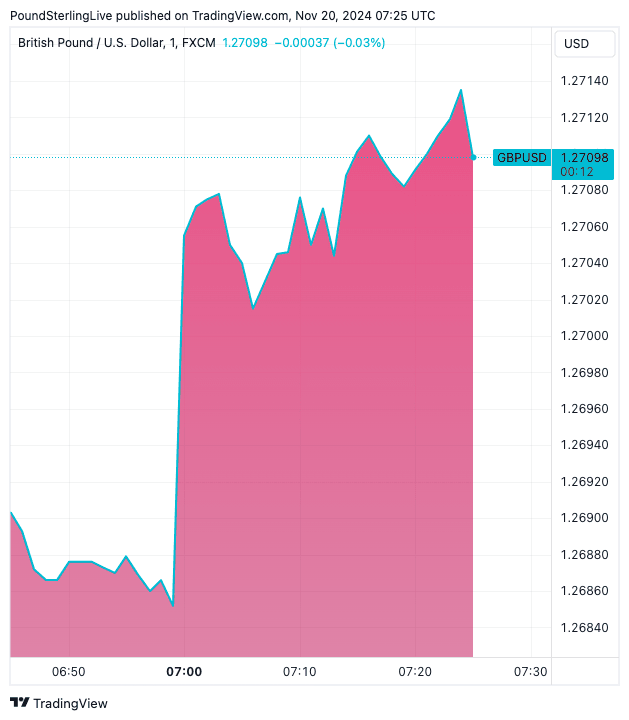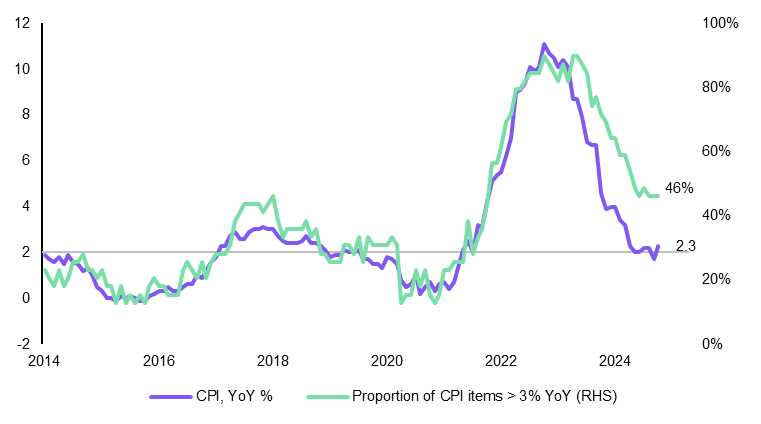
Image © Adobe Images
Pound Sterling jumped after the UK reported a broad-based inflation rise in October.
The Pound to Euro exchange rate rallied back to 1.20 in the minutes after the ONS said CPI inflation rose to 2.3% year-on-year in October from 1.7% in September, a bigger rise than the 2.2% the market anticipated.
The monthly rate of inflation rose to 0.6% in October, from being flat the month before. The crucial CPI services annual rate rose from 4.9% to 5.0%, sending the Bank of England a stark message that it must remain vigilant of cutting interest rates too fast.
"GBP rose this morning after all CPI numbers came in higher than expected, reducing the odds of a December rate cut and reducing the total number of rate cuts expected by the BoE in their easing cycle. Markets now expect only 60 bps worth of rate cuts by the end of 2025," says Thanim Islam, Head of FX Analysis at Equals Money.
The Pound to Dollar exchange rate rallied back above 1.27 as it followed a rise in UK bond yields, reflecting expectations that borrowing costs will stay higher for longer. The odds of a December rate cut retreated following the release, consistent with the Pound's rise.
"Renewed price pressures from the fiscal loosening in October’s Budget means that the CPI rate is likely to stay above the 2% target for longer than previously expected," says Alpesh Paleja, Interim Deputy Chief Economist at the CBI. "Coupled with continued strength in services price inflation and wage growth, this all but rules out the prospect of a faster pace of rate cuts in the year ahead."
The ONS says rising lift and electricity costs drove the increase in inflation in October after Ofgem lifted its energy price cap in October 2024.
Electricity prices rose by 7.7% in October 2024, having fallen by 7.5% between the same two months last year. Gas prices rose by 11.7% in October 2024, having fallen by 7.0% between the same two months last year.
Above: GBP/USD at 1-minute intervals showing the post-CPI release spike.
"So much for predictions of sub-2% inflation. Since May 2021, there have been 41 months of CPI inflation of 2% or more and just one month under 2pc (Sep 2024). OBR and BoE now predicting a prolonged period of >2% inflation with Budget tax increase adding to upward price pressures," says Andrew Sentance, a former member of the Bank of England's MPC.
Simon French, an economist at Panmure Gordon says the most 'hawkish' part of the UK CPI release is the fact that there are still almost half (46%) of CPI items that have their prices growing at at more than 3%.
"This number would need to fall back to closer to 30% (at least historically) for stable 2% price increases," he notes.
Image courtesy of Simon French at Panmure Gordon.
The Bank of England will almost certainly keep interest rates unchanged next week based on the testimony of Governor Andrew Bailey to Parliament's Treasury Select Committee on Tuesday.
Bailey is unsure how the £26BN job tax announced in October will impact inflation. He said the extra costs businesses now face could be passed on through higher prices, absorbed via lower margins, boosting productivity, offering smaller pay rises, or shedding workers.
Recent data has also given Bailey "cause to reflect". Based on this, next month is too soon for a consecutive rate cut.
The British Pound has been one of 2024's best-performing G10 currencies, aided by a series of economic growth surprises and a cautious approach to interest rates at the Bank of England.
However, growth has stalled since the election and the budget is anticipated to lead to job losses as employers face a rise in job taxes and increasingly unfavourable employment laws.
This creates an unsavoury cocktail of low growth and high inflation, or stagflation.
"The surprising strength of the latest inflation figures gives the Bank of England a conundrum. With economic growth in the UK stalling, rate cuts would seem like the appropriate medicine, however, cutting rates into inflationary strength wouldn't usually be what the economic doctors order," says Isaac Stell, Investment Manager at Wealth Club.
A stagflationary environment would not be supportive of the Pound in 2025.


